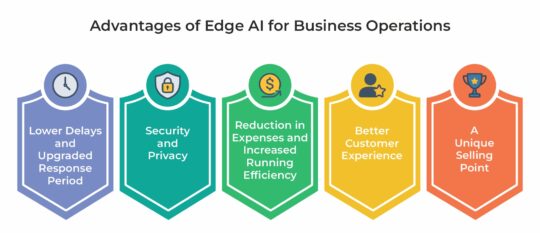Edge AI for business operations is getting popular with time as organizations are finding newer ways of optimizing their workflows, automate the business approaches and encourage suitable for innovation. It also addresses concerns such as lowering costs, security, and delays in business operations. Let’s understand edge AI more extensively and its benefits for business advancement.
What is Edge AI?
Edge AI means when the abilities of artificial intelligence (AI) are incorporated into the local devices and systems, such as sensors or IoT, that operate at the edge of the network. It is also a combination of edge computing and artificial intelligence to achieve the tasks of machine learning straight on the interlinked edge devices.
In contrast to the traditional AI systems that rely on centralized servers for the processing of the information and analysis, edge AI allows the devices to perform those tasks locally. Edge computing enables the data to be kept near the device, and the AI algorithms allow the data processing on the network edge, with or without the presence of the internet. Therefore, you can process the data in fractions of a second, providing instantaneous assessment and feedback.
Some of the devices that work on using the edge AI technology are now trending, self-driving cars, wearable devices, security cameras, smart appliances in our homes.
Why is Edge AI for Business Operations a Trend?
Digital transformation will continually change businesses and their growth. Several industries are embracing Edge AI as the need for localized information processing, better data privacy, and operational efficacy is in demand. Edge AI has the range to deliver versatility, quickness, and swiftness. It also provides substantial benefits over the traditional centralized methods. Edge AI pulls intelligence closer to the origin of the generation of data, conventionally on the edge devices.
On the contrary, traditional AI is dependent upon centralized cloud servers. On the other hand, Edge AI is becoming gradually more quintessential for businesses in an endeavor to incorporate AI technologies to lower the costs, increase efficiency, spur the revenues, upgraded and satisfying customer experiences. Edge AI for business operations offers exclusive benefits that align closely with present-day business goals.
Advantages of Edge AI for Business Operations
Lower Delays and Upgraded Response Period: As edge processes the information locally, thus removing the dependence for data transfer to the centralized servers. This remarkably reduces the time delay, enabling organizations to respond quickly to accompanying events. Rapid decision-making can be done as information processing is fast and therefore businesses can take decisions instantly. This leads to better-quality operational efficiency and improved customer experiences.
Security and Privacy: Improve as Edge AI processes the data locally, which minimizes the risk of data breaches and illegal access, thus protecting the data. Edge devices can be equipped with robust security mechanisms to protect the critical framework and intellectual property.
Reduction in Expenses and Increased Running Efficiency: This are the benefits that Edge AI offers as it lowers the requirement for pricey cloud infrastructure and data relocation costs. When the data is processed locally, Edge AI upgrades the resource allotment and energy expenditure. Predictive maintenance by AI-driven Edge can find possible equipment failures before they take place, reducing time-outs and maintenance expenses.
Better Customer Experience: It is one of the priorities, as Edge AI allows customization of products and services, personalizing suggestions and personalized customer marketing campaigns. AI-driven chatbots and autonomous assistants can provide real-time, individualized support, enhancing customer approval.
A Unique Selling Point: It needs to be essential in a competitive market. By utilizing Edge AI, organizations can elevate building innovative solutions and outsmart the competition in their particular businesses. Edge AI speeds up the development and distribution of AI applications, enabling businesses to respond quickly to the market economy and consumer demands.
Challenges in Implementing Edge AI for Business Operations
Implementing Edge AI presents its own challenges that businesses must address to fully utilize its potential.
Lack of Industry Norms: Rapport problems are intensified by the necessity for industry standards, especially in the hardware sector. It is challenging for developers to build Edge AI applications that are universally compatible due to the discrepancies in computing capabilities among various edge devices. According to the report, creating industry-wide hardware standards is crucial for enabling edge AI solutions' scalability and streamlined incorporation across a range of devices and environments.
Data Management: Since edge AI utilizes edge devices instead of the cloud to handle and process massive volumes of data, issues arise with data and storage.
Integrating Legacy Systems: It that might rely on outdated interfaces, monolithic architectures, proprietary tools, and hardware or software compatibility issues is a challenge for organizations aiming to implement edge AI.
Parting Words to Keep in Mind
Business is already being revolutionized by edge AI, especially in terms of how businesses provide value to their clients. The ability to extract, process, and act upon data generated from billions of devices and machines is critical to effectively utilizing edge AI as we enter an era of unprecedented connectivity.
But there are problems in the way of successfully implementing Edge AI for business operations. When considering the costs of integration, organizations must compete with technical challenges, security concerns, and the need for specialized proficiency. Businesses can master these challenges and fully utilize Edge AI by making informed investments in tools, fostering cooperation with knowledgeable vendors, and committing to ongoing skill development.
The future is here, and companies will continue to build new sources of profit, spur innovation, launch developments more quickly, and maintain their competitiveness in a world that is becoming increasingly data driven. Those who want to thrive in the age of innovative, networked strategies must adopt edge AI; it is no longer an option.
For more informative technologies and strategies, check out WisdomPlexus!
Recommended For You:
How Emerging Technologies Like AI Can Optimize KYB Processes for Businesses





